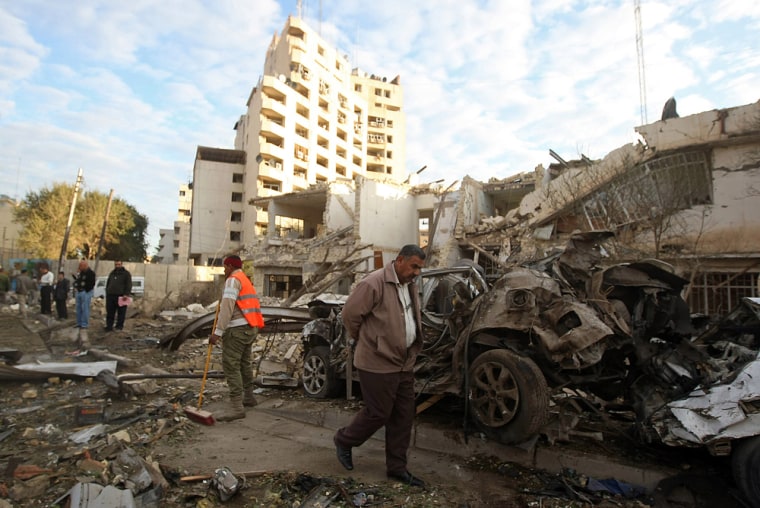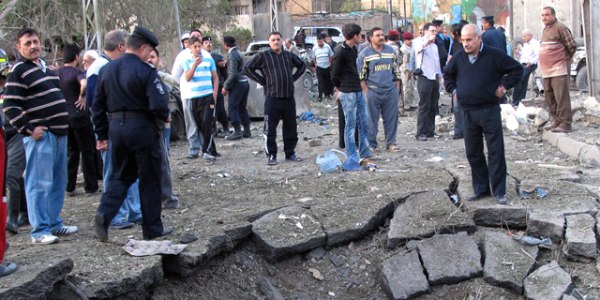Three car bombs exploded Monday near three Baghdad hotels popular with Western journalists, security contractors and businessmen. At least 37 people were killed and more than 104 injured, security officials said.
The blasts — coming in a span of about 15 minutes in downtown Baghdad — came shortly before state television announced that .
There was no claim of responsibility for the latest major attacks in Baghdad — about six weeks after a series of blasts killed 127 and brought outcry against Iraq's government for repeated security lapses as U.S. troops withdraw.
The first explosion struck at about 3:40 p.m. in the parking lot of what once was the Sheraton Hotel, toppling high concrete blast walls protecting the site and damaging a number of buildings along the Abu Nawas esplanade across the Tigris River from the Green Zone, two Iraqi police officials said.
Two other blasts followed minutes later, striking near the Babylon Hotel and the al-Hamra Hotel.
Slideshow 6 photos
Dozens dead in Baghdad bombings
The Washington Post, which has a bureau at the al-Hamra property, said three of its Iraqi employees were wounded. "The windows of the house were shattered in the blast, and much of the bureau is in tatters," it reported. "Three Post employees were wounded by flying glass. Two of them sustained head injuries, and a third has broken ribs and a broken arm. All three are conscious, and the injuries do not appear life-threatening."
The officials said the death toll was expected to rise. According to initial tallies, 16 of the victims were near the al-Hamra, 14 near the Sheraton, and seven died near the Babylon, including two policemen.
No Westerners were reported killed or seriously injured in any of Monday's three attacks.
Iraqi police said suicide attackers had detonated three explosives-packed cars just outside the hotels.
Government spokesman Ali al-Dabbagh said the latest bombings "represent an extension" of the activities of insurgents linked to Saddam's regime. But he stopped short of declaring the blast as possible revenge for the execution.
Blastwalls fell like dominoes
Outside the former Sheraton, a high-rise tower with views of the Tigris River and the fortified Green Zone on the other side, the blast left a 10-foot-deep crater in the parking lot.
Cars were torn apart by the spray of metal and glass, which littered the lawns and courtyards of the popular fish restaurants along the river.
The hotel has not been a regular hotel for years and largely houses company offices and some media organizations, but some adventurous international tour groups began using it last year.
The Babylon Hotel, which was hit by the second bomb, is used by Iraqi travelers and sometimes for government meetings.
The al-Hamra appeared to have been extensively damaged, according to NBC staff in Baghdad. Before the bomb went off, two men in a car opened fire on guards at the hotel checkpoint, a police official said.
Clinton ties to March elections
Secretary of State Hillary Clinton linked the bombings to the forthcoming elections in Iraq in March, saying the upcoming vote is proof that "politics is working in Iraq."
"That is the worst possible outcome for terrorists," she said of the elections.
Clinton predicted that attacks like this would likely continue until the election. "We unfortunately believe there will be continued efforts by the terrorists by al-Qaida in Iraq, to try to upend the commitment of the Iraqi people for a democratic future."
Ahmed Rushdi, a journalist in Baghdad, told the Al Jazeera news network that the hotels appeared to have been the targets.
"These hotels were supposed to have major security because it's open for all the foreign journalists," he said.
"Targeting these major hotels means that everyone here in Baghdad is targeted."
No one has claimed responsibility for the attacks, but Saad al Mutalabi, an adviser to the Iraqi council of ministers, told Al Jazeera: "It is a signature of al-Qaida. I don't think any of the political forces in Iraq would commit such an atrocity. It would not benefit any of them.
The blasts come about a month a half after a series of five blasts struck Baghdad, killing 127 people and injuring more than 500.
The Dec. 8 attacks — which included suicide bombings outside a court complex and the Finance Ministry — brought a wave of outrage from parliament members and others for security lapses in the capital.
Multiple blasts in August and October also targeted government buildings, killing more than 255 people.
Prime Minister Nouri al-Maliki blamed those attacks on groups loyal to Saddam Hussein's now-outlawed Baath Party.
Earlier Monday, an Iraqi security official defended a bomb-detecting device that Britain banned for export to Iraq because of questions about whether it works, saying it would be a "big mistake" to withdraw it from checkpoints.
The ADE651, made by the British company ATSC, is used at security points across Iraq, including outside the protected Green Zone that includes the Iraqi parliament and the U.S. and British embassies. Britain halted the export of the machine to Iraq and Afghanistan after a BBC report challenged its effectiveness.
But Col. Hato al-Hashemi, a senior explosives expert at the Interior Ministry, said the estimated 2,000 devices used by Iraqi security forces would not be taken out of service.
"We have great confidence in this device," al-Hashemi said. "They have proven their effectiveness in discovering and seizing many car bombs and cars that were loaded with explosives and weapons."

